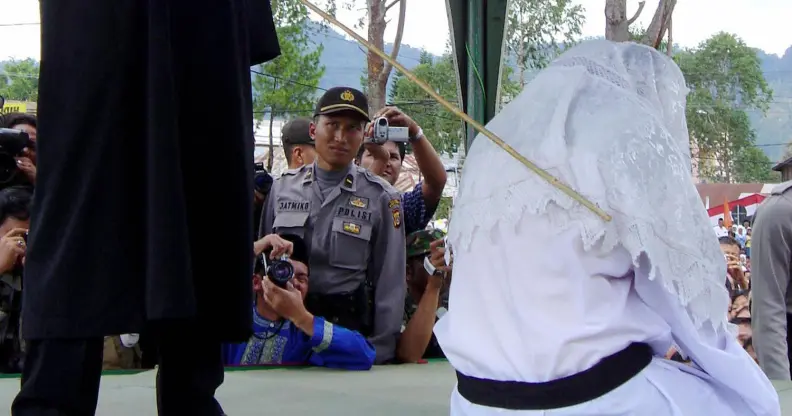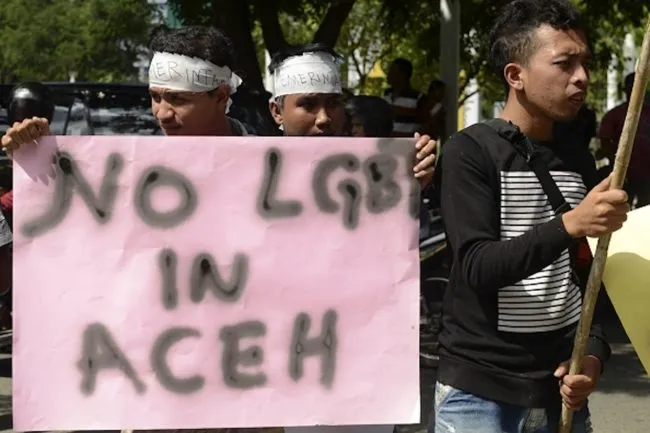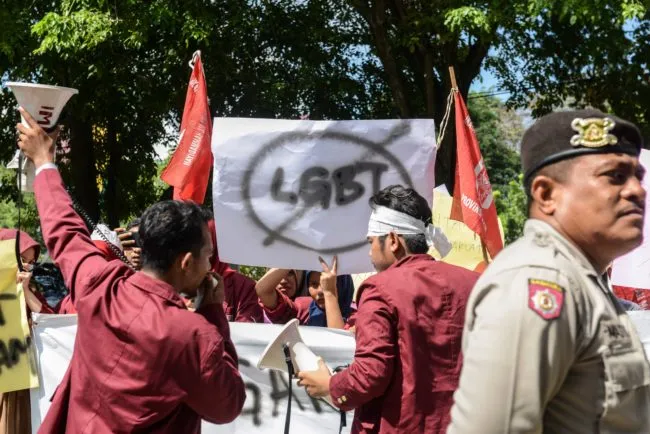Indonesian province where LGBTQ+ people face rife persecution wants to introduce beheadings

An Acehnese executor flogs a convicted woman (Photo by STR/AFP/Getty Images)
A region in Indonesia that has subjected LGBTQ+ people to rife persecution has announced that they are considering introducing beheading as a form of criminal punishment.
The province, Aceh, is the only one in Indonesia to enforce Sharia law.
This type of law criminalises LGBTQ+ identities, meaning that the community faces severe punishment if they live openly.
In the last few months, we have seen large numbers of arrests, torture and humiliation of LGBTQ+ people in Aceh.
In January, 12 transgender women were arrested and had their heads shaved in an effort “to turn them into men”.
Authorities also dressed the trans women in stereotypically male clothing, in the raid which was called “operasi penyakit masyarakat,” which translates as “community sickness operation”.

(Getty)
North Aceh Regency Police Chief Ahmad Untung Surianata said the 12 trans detainees were part of a “social disease” and had been taken to police headquarters, where they would be coached “until they really become men.”
The local government in Aceh has announced intentions to introduce beheading as a legal punishment.
Beheading is banned by International law, with the UN formally calling it a “cruel, inhuman and degrading treatment”.
Syukri M Yusuf, the head of Aceh’s Sharia Law and Human Rights Office, said that the government was considering introducing beheading as a punishment for murder convictions.
Currently, if someone is sentenced to capital punishment then a firing squad is used.
Typically, crimes such as murder and drug trafficking are sentenced to this level of punishment.
If Indonesia decides to go through with enforcing beheading then they will join Saudi Arabia on the list of countries that use the method.
In Saudi Arabia, acts of homosexuality or changing your gender identity can be punished with anything from fines and floggings to life in prison, death, and torture.

(Getty)
Many fear that Indonesia is becoming worse for LGBTQ+ people.
Although it is not illegal to be homosexual in the country, authorities have launched a crackdown and proposed criminalisation of gay sex.
Lawmakers are set to decide whether they will pass the bill, which reportedly has support from all 10 of main political parties.
It would make gay sex punishable by up to five years in prison.
The Indonesian Supreme Court narrowly blocked a similar measure from passing in December, but it seems that was only a temporary reprieve.
The UN human rights commissioner has warned Indonesia that it must stop its crackdown on the LGBTQ community and protect the minority from rising intolerance in the country.
Speaking in Jakarta, Zeid Ra’ad Al Hussein said that Indonesia had a progressive track record when it came to human rights, but that it’s failures to the LGBTQ community could be damaging.
He said: “The hateful rhetoric against this community that is being cultivated seemingly for cynical political purposes will only deepen their suffering and create unnecessary divisions.
“Indonesia has since 1998 managed to transition to democracy and couple it with strong economic growth.
“At a time when it is consolidating its democratic gains, we urge Indonesians to move forward – not backwards – on human rights.
“There are some dark clouds on the horizon but … I hope the common sense and strong tradition of tolerance of the Indonesian people will prevail over populism and political opportunism,” he added.

